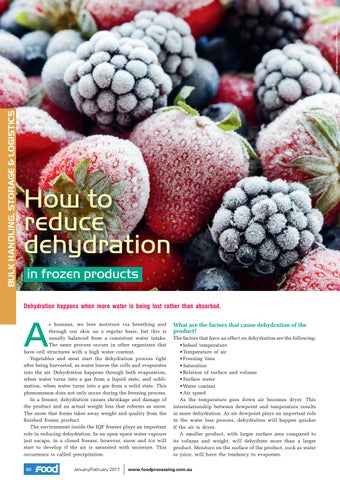© stock.adobe.com/au/Maksim Shebeko
BULK HANDLING, STORAGE & LOGISTICS
How to reduce dehydration in frozen products Dehydration happens when more water is being lost rather than absorbed.
A
s humans, we lose moisture via breathing and through our skin on a regular basis, but this is usually balanced from a consistent water intake. The same process occurs in other organisms that have cell structures with a high water content. Vegetables and meat start the dehydration process right after being harvested, as water leaves the cells and evaporates into the air. Dehydration happens through both evaporation, when water turns into a gas from a liquid state, and sublimation, when water turns into a gas from a solid state. This phenomenon does not only occur during the freezing process. In a freezer, dehydration causes shrinkage and damage of the product and an actual weight loss that reforms as snow. The snow that forms takes away weight and quality from the finished frozen product. The environment inside the IQF freezer plays an important role in reducing dehydration. In an open space water vapours just escape, in a closed freezer, however, snow and ice will start to develop if the air is saturated with moisture. This occurrence is called precipitation. 60
January/February 2017
What are the factors that cause dehydration of the product? The factors that have an effect on dehydration are the following: • Infeed temperature • Temperature of air • Freezing time • Saturation • Relation of surface and volume • Surface water • Water content • Air speed As the temperature goes down air becomes dryer. This interrelationship between dewpoint and temperature results in more dehydration. As air dewpoint plays an important role in the water loss process, dehydration will happen quicker if the air is dryer. A smaller product, with larger surface area compared to its volume and weight, will dehydrate more than a larger product. Moisture on the surface of the product, such as water or juice, will have the tendency to evaporate.
www.foodprocessing.com.au
